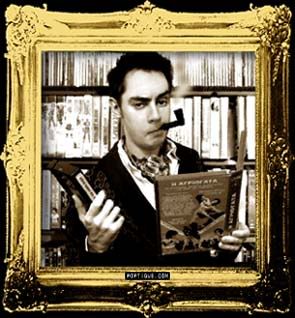MORECAMBE & WISE CHRISTMAS SHOWS (or lack of them)
The BBC have ruined my Christmas. Well, perhaps that's a bit strong as it's takes considerably more than lazy television scheduling to spoil one's festive cheer - but it does gnaw away at me a teeny bit that no-one at the world's most revered broadcaster saw fit to stick on a vintage Morecambe & Wise Christmas Show this year.
 For the uninitiated Eric Morecambe & Ernie Wise were the UK's foremost comedy double act from the 60s through until the end of the 70s, having slogged their way up from the Northern Variety circuit to television in the early 50s, only to make a hasty retreat after the disastrous reception which greeted their first (now long lost) BBC series, Running Wild. Heavily influenced by the likes of Abbott & Costello, Ernie Wise performed the role of the straight man whilst Eric played the comic in a Americanised act of fast talking patter, put downs and wisecracks (as witnessed in this rare clip from 1958).
For the uninitiated Eric Morecambe & Ernie Wise were the UK's foremost comedy double act from the 60s through until the end of the 70s, having slogged their way up from the Northern Variety circuit to television in the early 50s, only to make a hasty retreat after the disastrous reception which greeted their first (now long lost) BBC series, Running Wild. Heavily influenced by the likes of Abbott & Costello, Ernie Wise performed the role of the straight man whilst Eric played the comic in a Americanised act of fast talking patter, put downs and wisecracks (as witnessed in this rare clip from 1958).
They truly hit their stride with their second bid for TV stardom, working with writing team Dick Hills and Sid Green on commercial television. Together they took their straight-man/funny-man act as far as it could go - affording them twelve appearances on the Ed Sullivan Show in the US and a handful of charming but lacklustre movies throughout the 1960s.
In 1968 Morecambe & Wise triumphantly returned to the BBC for their first colour series, but soon after Eric suffered a heart attack. Fearing the worse and believing the act finished, Hills & Green jumped ship - vanishing off to obscurity as far as posterity is concerned.
Far from a tragedy this allowed for the final piece of the puzzle to fit, as Eric & Ernie were joined by writer Eddie Braben, who correctly observed that the act lacked the genuine warmth and friendship the two shared off screen. Embellishing their comic personas, Braben took his lead from the greatest double-act of all - Laurel & Hardy.
By the mid-70s the Morecambe & Wise Show was bigger than ever, with the annual Christmas episode enshrined as the nation's favourite. It distilled their mixture of sketches, songs and special guests into the perfect festive format and in a televisual world of only three channels it became the one programme virtually everyone tuned in to. Its zenith was reached in 1977 when the show garnered the highest ever rating for an entertainment programme - a record it still holds.
Inevitably the only way to go from the top is down. Soon after they signed a new contract with commercial network Thames Television, Eric suffered another heart attack that led to his retirement. Eric was felled by a fatal stroke in 1984, with Ernie Wise following his partner in 1999.
It's hard to describe exactly what I love so much about the Morecambe & Wise Christmas Shows. Despite being barely seven when the last was originally transmitted they've always remained an incredibly important Christmas tradition for a nostalgic old cad like myself. For a start, they're extremely inventive, irreverent and funny.
The BBC have ruined my Christmas. Well, perhaps that's a bit strong as it's takes considerably more than lazy television scheduling to spoil one's festive cheer - but it does gnaw away at me a teeny bit that no-one at the world's most revered broadcaster saw fit to stick on a vintage Morecambe & Wise Christmas Show this year.
 For the uninitiated Eric Morecambe & Ernie Wise were the UK's foremost comedy double act from the 60s through until the end of the 70s, having slogged their way up from the Northern Variety circuit to television in the early 50s, only to make a hasty retreat after the disastrous reception which greeted their first (now long lost) BBC series, Running Wild. Heavily influenced by the likes of Abbott & Costello, Ernie Wise performed the role of the straight man whilst Eric played the comic in a Americanised act of fast talking patter, put downs and wisecracks (as witnessed in this rare clip from 1958).
For the uninitiated Eric Morecambe & Ernie Wise were the UK's foremost comedy double act from the 60s through until the end of the 70s, having slogged their way up from the Northern Variety circuit to television in the early 50s, only to make a hasty retreat after the disastrous reception which greeted their first (now long lost) BBC series, Running Wild. Heavily influenced by the likes of Abbott & Costello, Ernie Wise performed the role of the straight man whilst Eric played the comic in a Americanised act of fast talking patter, put downs and wisecracks (as witnessed in this rare clip from 1958).They truly hit their stride with their second bid for TV stardom, working with writing team Dick Hills and Sid Green on commercial television. Together they took their straight-man/funny-man act as far as it could go - affording them twelve appearances on the Ed Sullivan Show in the US and a handful of charming but lacklustre movies throughout the 1960s.
In 1968 Morecambe & Wise triumphantly returned to the BBC for their first colour series, but soon after Eric suffered a heart attack. Fearing the worse and believing the act finished, Hills & Green jumped ship - vanishing off to obscurity as far as posterity is concerned.
Far from a tragedy this allowed for the final piece of the puzzle to fit, as Eric & Ernie were joined by writer Eddie Braben, who correctly observed that the act lacked the genuine warmth and friendship the two shared off screen. Embellishing their comic personas, Braben took his lead from the greatest double-act of all - Laurel & Hardy.
By the mid-70s the Morecambe & Wise Show was bigger than ever, with the annual Christmas episode enshrined as the nation's favourite. It distilled their mixture of sketches, songs and special guests into the perfect festive format and in a televisual world of only three channels it became the one programme virtually everyone tuned in to. Its zenith was reached in 1977 when the show garnered the highest ever rating for an entertainment programme - a record it still holds.
Inevitably the only way to go from the top is down. Soon after they signed a new contract with commercial network Thames Television, Eric suffered another heart attack that led to his retirement. Eric was felled by a fatal stroke in 1984, with Ernie Wise following his partner in 1999.
It's hard to describe exactly what I love so much about the Morecambe & Wise Christmas Shows. Despite being barely seven when the last was originally transmitted they've always remained an incredibly important Christmas tradition for a nostalgic old cad like myself. For a start, they're extremely inventive, irreverent and funny.
They're also a visual guide to 20th Century British comedy, bridging the gap between the music hall stage and the television age, whilst tipping a hat to the Golden Age of Hollywood along the way.
Behind the one-liners and skits the respect and admiration Eric & Ernie had for each other and for their audience shines through - the legacy they left behind is as much a part of Christmas viewing as It's a Wonderful Life.
It's a legacy the BBC perhaps takes a bit too lightly.



0 Comments:
Post a Comment
<< Home